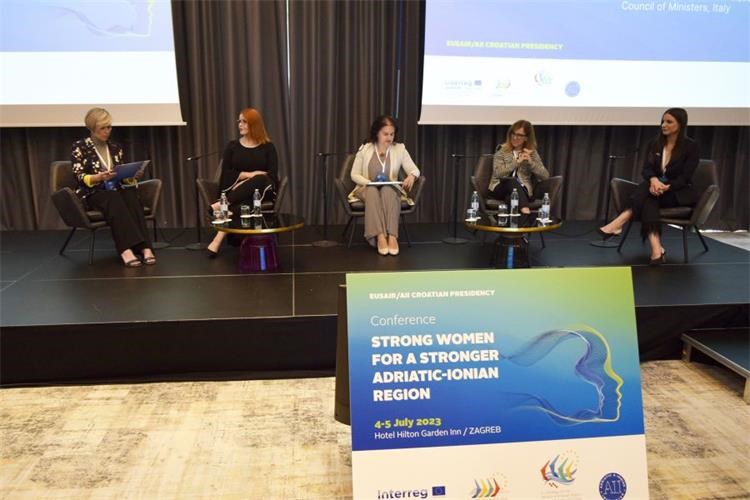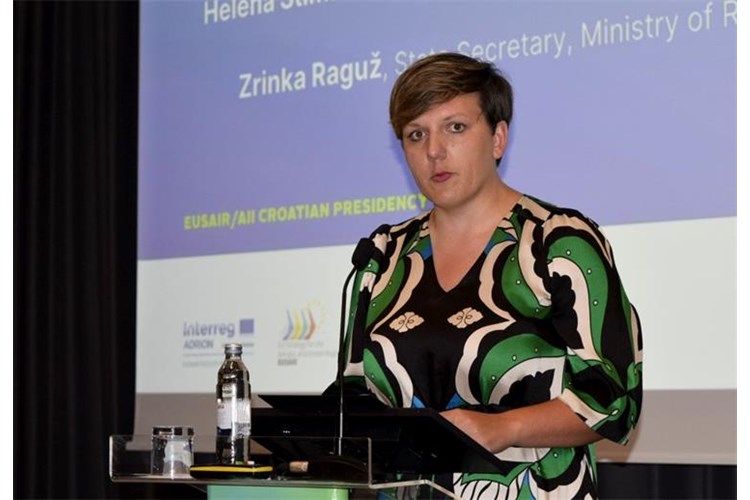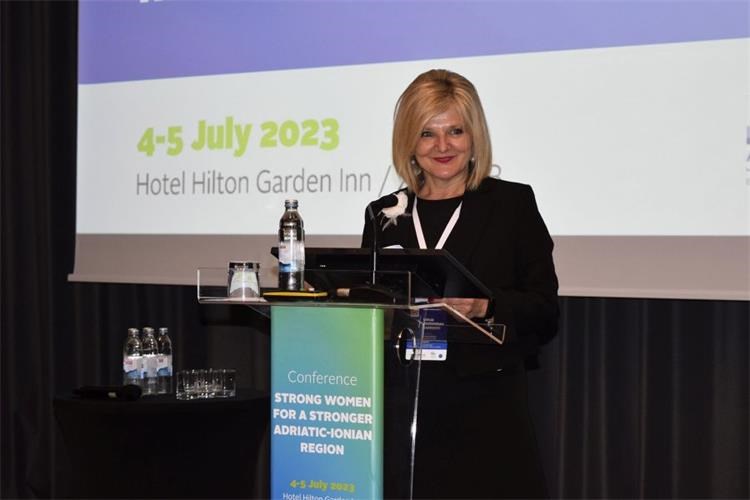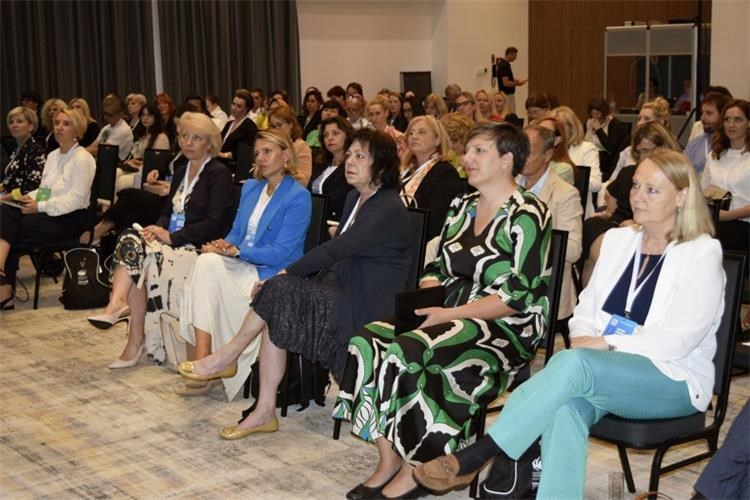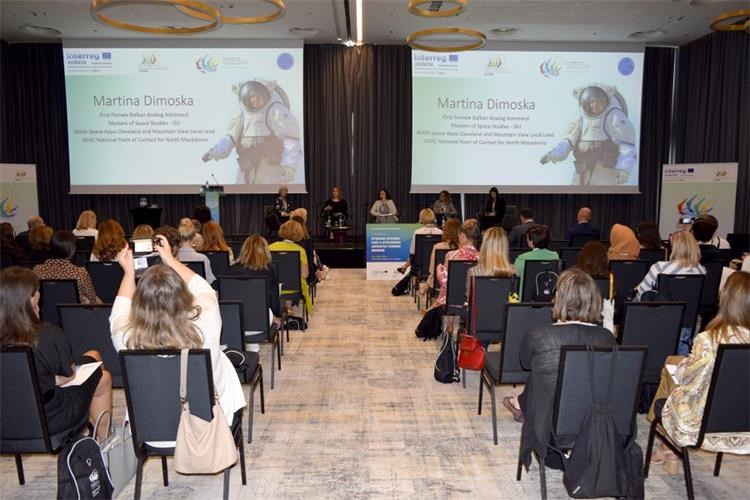- Published: 10.07.2023.
Thematic conference "Strong Women for a Stronger Adriatic-Ionian Region" held in Zagreb
Thematic conference "Strong Women for a Stronger Adriatic-Ionian Region" held in Zagreb within Croatian Presidency of the EU Strategy for the Adriatic-Ionian Region EUSAIR and the Adriatic-Ionian Initiative AII
After the successful inaugural conference of the Croatian Presidency of the EU Strategy for the Adriatic-Ionian Region EUSAIR and the Adriatic-Ionian Initiative AII, held on June 20 in Zagreb and two thematic events followed immediately afterwards: conference on sustainable nautical tourism and workshop on maritime robotics and applications, Ministry of Foreign and European Affairs and the Ministry of Regional Development and EU Funds, as national EUSAIR coordinators, and the Ministry of Tourism and Sport, as a partner of the EUSAIR Facility Point Project, organized the third thematic event this week as part of the Croatian presidency of EUSAIR and AII - two-day conference "Strong Women for a Stronger Adriatic-Ionian Region".The conference was held in Zagreb on July 4 and 5 with the participation of representatives of EUSAIR member states, the European Commission, the public, scientific-research community, economic and civil sector, and included lectures, panels, presentations of research results and examples of good practice, career success and paths of strong women of the Adriatic-Ionian region.
“In a world that is facing unprecedented and overlapping crises and challenges – such as the climate change, pandemic, war, but also natural disasters, food insecurity, supply chain disturbances, green transition challenges - it is all the more important to recognise the unique role of women in responding to them, and to make women more resilient, more empowered, and overall better equipped to act, and, in turn, transform for the better their communities and the entire society. I cannot emphasize enough the importance of having women at the table, in the decision-making processes, in leadership roles at all levels, to effectively respond to challenges we are facing – be it war, environmental challenges, or social injustice” - said Ms Andreja Metelko Zgombić, State Secretary of the Ministry of Foreign and European Affairs, opening the conference on behalf of the organizer.
It was pointed out that issues like domestic violence, inequality in access and position on the labour market, insufficient social support for harmonizing private and business life - demand better responses at all levels. Fact presented by Ms Elena Di Federico from the EU CAP Network, that women in rural parts of the European Union have an average of 40% less pension than men was an unpleasant surprise.
After the Opening Session, four panels followed: "STEMazing women", "Women in business", "Women Entrepreneurship in Rural Tourism" and "Civil society - strengthening the role of youth in the region for the future".
Here are the highlights
Women should turn more to leadership and be initiators and implementers of social change. It is not just a matter of "being fair", as stated at the conference, but also a matter of economic prosperity. Today, women make up only 28% of the global workforce in science, technology, engineering and mathematics. There are also significant gender gaps in some of the fastest-growing and highest-paying jobs of the future, such as computer science and engineering. Only 21% of female students is studying engineering and 19% of them studying computer science. For example, giving women equal opportunities to advance in STEM careers will reduce the gender pay gap, increase women's economic security, and ensure a much-needed diverse STEM workforce. The European Institute for Gender Equality estimates that increasing the number of girls and women in STEM would increase the EU's GDP by 610 billion EUR by 2050 - the data were presented at the conference.
Changing the perception and gender stereotypes, attitudes, but also the real position of women in society is a difficult task for all of us, are making a slow progress. The first "STEMazing women" panel was held precisely with this aim in mind, moderated by Ms Andreja Čović Vidović, deputy head of the Representation of the European Commission in Croatia with speakers Ms Martina Dimoska, first female analog astronaut in North Macedonia and the Balkans, Ms Nina Drakulić, from the NGO Montenegrorobotics from Montenegro and Ms Samra Mujačić from the STEM Academy of the University of Tuzla - women who have achieved significant success in the STEM field, and who spoke about their career paths, challenges and achievements.
In her presentation on "Advancing gender equality in EU rural areas" Ms Elena Di Federico from the EU CAP Network, talked about the position of women in rural areas in Europe who are more exposed to precarious employment, part-time employment and/or informal employment and lack of support in the form of basic public services that would enable them to have a better position on the labor market. On the other hand, the empowerment of rural women can help to solve the key challenges faced by the rural areas of the EU: depopulation, aging of the population, lack of generational renewal, competitiveness of the agricultural and food sectors, lack of services. it is necessary to support women's entrepreneurship. , through trainings, mentoring, role models, cooperation, networking, improving access to basic public services and services, creating safe and stimulating environments, designing a strategy with women (not about them), redefining the concept of "success" and the permission to fail.
Ms Monika Udovičić, from Croatian Ministry of Tourism and Sport highlighted that - women make up a substantial portion of the tourism workforce; they constitute the majority of employees in the sector, especially in customer service, hospitality, and administrative roles; women have been gradually assuming leadership positions in the industry: more women are now holding managerial and executive roles in tourism organizations, including hotels, travel agencies, tour operators, and destination management companies; women are increasingly involved in entrepreneurship within the tourism sector, as well: many women-owned businesses, such as boutique hotels, bed and breakfasts, travel agencies, and tour companies, have emerged and flourished in various destinations. Women are actively pursuing education and training opportunities to enhance their skills and qualifications in the tourism sector. But, women who work in tourism industry mostly work underpaid jobs or underpaid leadership positions. According to the “Transition Pathway for tourism” - women in tourism earn about 15% less than their male counterparts. On a global level, they remain substantially underrepresented as leaders, and they make up only 21% of board members in tourism businesses. Yet, women’s positions in the industry has evolved, and women have become increasingly active and influential in various roles. This enables them to secure better employment opportunities and contribute to the industry's growth.
"Developing, retaining and attracting female talent is a strategic priority for the European Commission. To support a diverse and inclusive work environment in the European Union, its commitment to gender equality and inclusivity plays a vital role in advancing the empowerment of women in business, STEM, politics and all other areas. Through various initiatives and policies, the EU strives to create an enabling environment that fosters equal opportunities and promotes diversity. Through various initiatives and policies, the EU strives to create an enabling environment that encourages equal opportunities and promotes diversity. We need to empower the next generation of women, nurturing their dreams and aspirations. Mentorship, guidance and support are indispensable tools in equipping young girls and women with the confidence to pursue their ambitions. By investing in education and providing role models, we unlock the enormous potential of future women leaders, innovators and creators of change," concluded the conference on behalf of the European Commission, Ms Andreja Čović Vidović.
Among the speakers who made a valuable contribution to the conference were, as well, Vicky Stroumpou from the Greek Ministry of Tourism, Helena Štimac Radin from the Office for Gender Equality of the Government of the Republic of Croatia, Maria Luisa Esposito from the Adriatic-Ionian Euroregion AIE, Helena Sundblad Schafer from the European Commission, Fabio Pigliapoco from the Adriatic-Ionian Initiative AII and Cristiana Carletti from the Department for Equal Opportunities of the Italian Presidency of the Council of Ministers.
However, when it comes to numbers: this two-day conference dedicated to the position of women in the Adriatic-Ionian region societies, gathered 135 participants, of which 20 were men. That is, expressed as a percentage, 14.81%. Time will show whether this is enough to support the necessary social changes. Just as we need keynote speakers for events like this, we also need keynote listeners.
